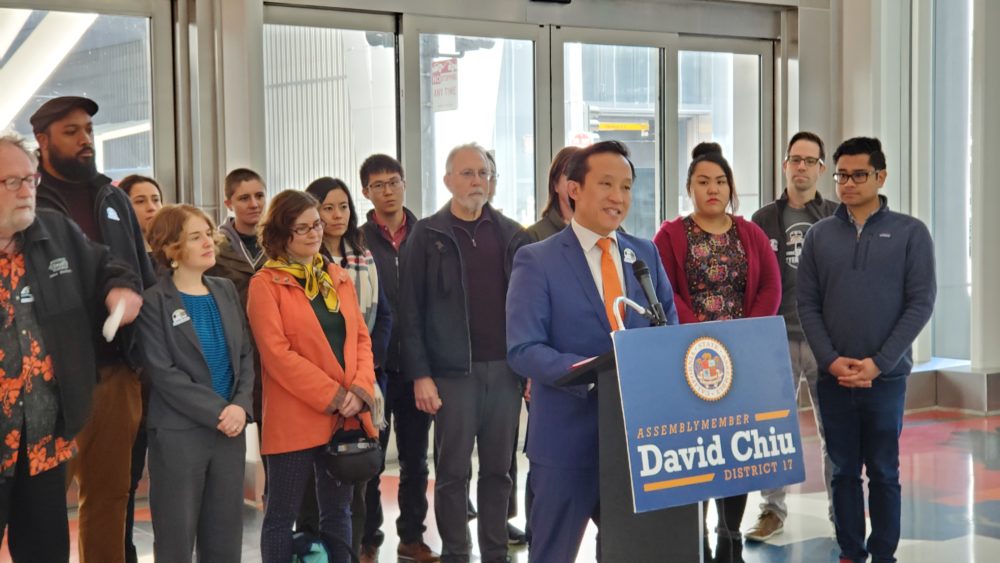Assemblyman pushes to simplify, standardize Bay Area transit systems
“Every day, hundreds of thousands of Bay Area residents experience a system that is fragmented and unreliable.”
“Every day, hundreds of thousands of Bay Area residents experience a system that is fragmented and unreliable.”
Navigating through just one transit system in the Bay Area can at times be challenging, but making connections between two or more transit systems can be even more frustrating. Assemblyman David Chiu is trying to change that.
Chiu (D-San Francisco) on Tuesday introduced Assembly Bill 2057 titled the Seamless Transit Act. If passed, the bill would require all of the 27 Bay Area transit agencies to report real-time arrival information and work toward standardizing bus fare, discount policies and a regional map.
Additionally, a task force would be established to tackle larger issues, including fare integration, schedule coordination and other capital projects.
Chiu said Tuesday at a press conference held at the Salesforce Transit Center, a major hub for AC Transit and Muni, that despite billions of dollars invested in public transportation, only 3 percent of Bay Area trips are made on public transit.
Chiu said:
“Every day, hundreds of thousands of Bay Area residents experience a system that is fragmented and unreliable.”

Criticizing the discombobulated system, Chiu said:
“Challenges of navigating 27 different transit agencies have created major barriers to solving congestion.”
Explaining the difficulty of his commute back and forth to school, Terry Taplin, a Berkeley resident and graduate of Saint Mary’s College, said:
“I’ve spent years as an undergraduate and graduate student commuting for three hours round trip across four cities transferring across three different transit agencies to get to class and back home”
Rebecca Saltzman, a member of the BART Board of Directors, said she knows Bay Area residents have to make hard choices when deciding to ride public transit.
Saltzman said when she lived in Oakland and finances were tight, she avoided taking BART and instead used her AC Transit monthly pass to get to San Francisco, which often meant a longer trip and bus transfer.
Saltzman said:
“Bay Area residents makes choices like this every single day and some of them make the choice of avoiding transit altogether because if it becomes too complicated or too expensive, they’re just not going to ride.”

Chiu also mentioned both he and his wife spend three to four hours each day commuting from The City to work. Chiu drives to his office in Sacramento and his wife commutes to San Jose.
Chiu said:
“If our transit systems worked better, the two of us wouldn’t have to drive alone in two separate cars. We’d have shorter commutes. We could actually get work done and we’d have more time for our son.”
Chiu’s announcement coincides with a ballot tax measure called Faster Bay that will appear on the November 2020 ballot. The measure looks to raise up to $100 billion over 40 years for Bay Area transportation projects.
Jerold serves as a reporter and San Francisco Bureau Chief for SFBay covering transportation and occasionally City Hall and the Mayor's Office in San Francisco. His work on transportation has been recognized by the San Francisco Press Club. Born and raised in San Francisco, he graduated from San Francisco State University with a degree in journalism. Jerold previously wrote for the San Francisco Public Press, a nonprofit, noncommercial news organization. When not reporting, you can find Jerold taking Muni to check out new places to eat in the city.
The suspect in a fatal Friday night hit-and-run incident that killed a 4-year-old boy surrendered to police Saturday evening...
The danger presented by high winds has prompted the East Bay Regional Park District to close until at least...
More than 8,400 PG&E customers remained without power Monday morning in the Bay Area after a day of windy...